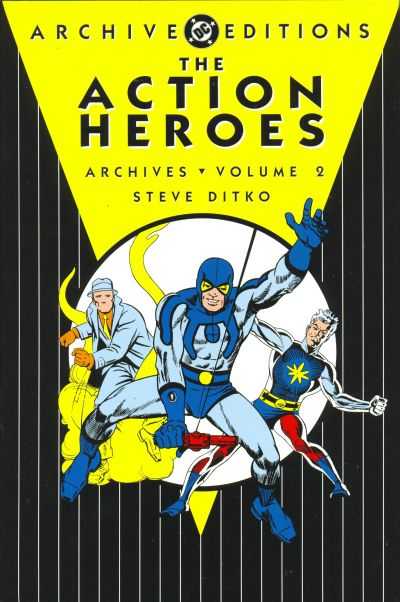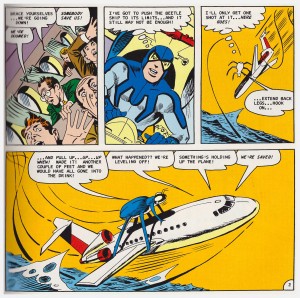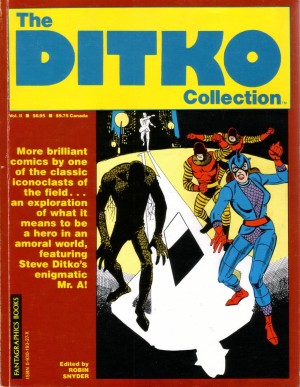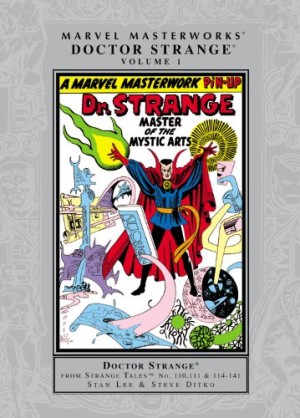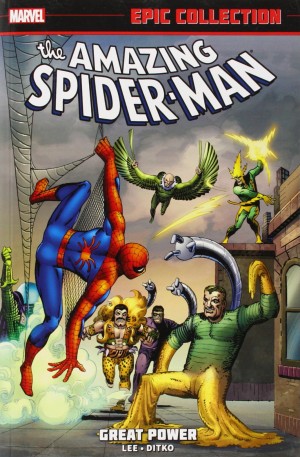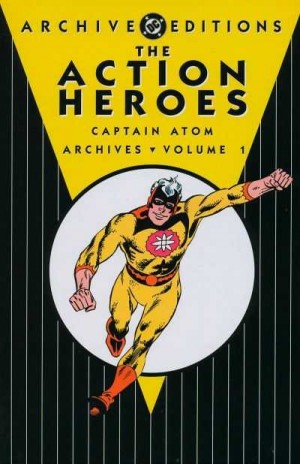Review by Frank Plowright
The content dates from 1966 to 1967 and as a batch these are unquestionably the best material published by Charlton Comics in their long and inglorious history. New editor Dick Giordano took some pride in his work, encouraging creators to experiment, and while only Steve Ditko’s material is included here, several others responded.
The volume reprints stories according to publication date, rather than collating via character. The most prominent is Blue Beetle, re-working Charlton’s already once revived 1940s superhero, first as a back-up strip in Captain Atom prior to his own title in which The Question was a back-up.
Ditko’s early 1960s Captain Atom work and 1966 return appear in Action Heroes Archives volume one. This Captain Atom differs. His scaled-down powers fit him more evenly alongside Charlton’s newer heroes, he’s largely Earthbound, he has a new, and frankly poorer, costume, and Nightshade is an equal participant in most stories. Ditko’s in complete charge, plotting as well as pencilling, and dialogue from Gary Friedrich or David Kaler far improves on Joe Gill’s stiff formality. The new Captain Atom abounds with ideas that Ditko skilfully ties together. Unfettered Ditko would be preferable to the inking of Rocke Mastroserio, but if that permitted the simultaneous Blue Beetle and Question strips it’s more than fair trade. Later stories inked by Frank McLaughlin look better, and the only lapse is the single story also plotted by Kaler, but that compensates by allowing Ditko to revisit a science-fiction setting. Ditko’s 1960s style has dated, but he’s a master storyteller, exemplified by a fantastic early sequence requiring Captain Atom to fix a faulty reactor that distorts his powers. Yet Captain Atom is the weakest of the three strips here.
After his fantastic run on Spider-Man, Ditko re-modelled Charlton’s nearest equivalent, the Blue Beetle. He re-cast the character as lighthearted inventor Ted Kord, gave him the fantastic flying bug to patrol the city, and out of respect to the few fans the laughably poor predecessor may have had, tied Kord’s version in. Not before stringing a mystery through the shorter strips where Kord is suspected of murdering the missing Dan Garrett. Ditko enjoyed himself immensely on Blue Beetle, producing balletic action sequences, inking and, for the most part, scripting the strip himself, and cramming in dynamic action-packed panels in to maximise the story. It would be the last strip Ditko created devoid of his philosophical views.
Those views are central to the Question, although lacking the hectoring manner later characterising Ditko’s work. Journalist Vic Sage is blunt and uncompromising with exacting standards. For Sage there are no grey areas, only the truth, and the strip has brilliant sequences of him isolated and urging complicity with the weak, the idle and scoundrels. Sage alone is fascinating, and the faceless trenchcoated alter-ego Ditko conceives is a profoundly disturbing visual effect. The only full length Question story is an intensely powerful dialogue-heavy slab of polemic irrespective of whether the reader’s views align with Ditko’s. Sage is the focus, under pressure to accept sponsorship from a known associate of gangsters and prepared to sacrifice his career in preference to compromise.
This volume also presents stories prepared for publication, but unseen until a 1970s fanzine dedicated to Charlton’s output, here in black and white. Blue Beetle puzzling over a remarkably designed villain is very welcome, but a pre-professional John Byrne inking Ditko’s pencils on Captain Atom is less successful despite concluding several 1960s plots. The volume closes with a 1970s gem by Alex Toth, another of comics great stylists. His take on the Question differs entirely from Ditko’s claustrophobic world, but is equally good.
